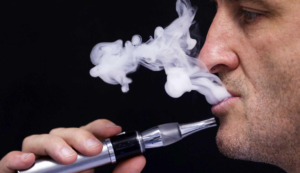Does Nicotine disposable vape Make You Lose Weight? Exploring the Health Impacts of E-Cigarettes is a question many people consider, especially when looking at nicotine’s appetite-suppressing effects. While some turn to nicotine as a weight loss aid, it’s important to understand both its short-term benefits and long-term health consequences. This article delves into the impact of nicotine on weight, the role of disposable vape in weight control, and the potential health risks involved. Whether you’re considering using disposable vape for weight management or simply curious about their effects on health, it’s crucial to weigh the facts carefully. Let’s explore the complex relationship between nicotine, e-cigarettes, and your health.

Table of Contents
1. What is Nicotine?
Nicotine is a powerful stimulant that affects the central nervous system. Upon consumption, it is rapidly absorbed into the bloodstream and reaches the brain, where it triggers the release of chemicals like dopamine, which produces feelings of pleasure. This stimulation can lead to an increase in heart rate, higher blood pressure, and even a temporary sense of well-being, which makes nicotine highly addictive. While nicotine itself does not directly cause cancer, it plays a key role in reinforcing the behaviors of smoking and e-cigarette use, both of which carry serious health risks.
2. Does Nicotine Make You Lose Weight?
The idea that nicotine could help with weight loss is an intriguing one, and indeed, research suggests that nicotine may have some short-term effects on body weight. However, using nicotine as a weight-loss method is not a safe or recommended strategy. Here’s how nicotine might affect weight:
1. Appetite Suppression
Nicotine is known to suppress appetite. It affects brain chemicals such as dopamine, norepinephrine, and serotonin (often referred to as “the happiness hormone”), which can lead to a reduction in food cravings. Many smokers report that their appetite decreases after smoking, and some even use smoking as a tool to curb hunger before meals.

2. Increased Basal Metabolic Rate (BMR)
Nicotine can also raise the body’s basal metabolic rate (BMR), which is the rate at which the body burns energy while at rest. By stimulating the sympathetic nervous system and increasing the release of adrenaline, nicotine may promote fat burning, which leads to a slight increase in calorie expenditure.
3. Fat Oxidation
Nicotine has been shown to increase fat oxidation, which is the process of breaking down fat molecules to be used as energy. By boosting norepinephrine levels in the body, nicotine can promote the breakdown of stored fat and the release of fatty acids into the bloodstream. This means that, in the short term, nicotine may help the body burn more fat.

4. Decreased Physical Performance & Long-Term Risks
While nicotine might provide short-term effects on appetite and metabolism, it comes with long-term risks that can negatively affect weight management. For example:
- Lung Function Decline: Smoking and the use of e-cigarettes can damage the lungs, reducing physical endurance and making it harder to engage in exercise, which is essential for long-term weight control.
- Cardiovascular Health: Nicotine raises blood pressure and heart rate, which increases the risk of heart disease and stroke.
- Hormonal Imbalances: Chronic nicotine use can disrupt hormonal balances, especially in women, affecting appetite regulation, metabolism, and overall body composition.
5. Weight Gain After Quitting Smoking
Many individuals experience weight gain after they quit smoking. While nicotine helps suppress appetite and increases metabolism in smokers, once nicotine use is stopped, the body’s metabolism slows down, and appetite often rebounds. This is why some people gain weight when they stop smoking, as their body adjusts to life without nicotine.
6. Health Risks
The potential for weight loss through nicotine is not worth the severe health risks associated with its use:
- Cancer: Smoking and e-cigarette use increase the risk of lung cancer, throat cancer, and other types of cancer.
- Respiratory Diseases: Chronic lung conditions, including emphysema and chronic obstructive pulmonary disease (COPD), are common in smokers.
- Mental Health: Nicotine use has been linked to anxiety, depression, and other mental health issues.
- Addiction: Nicotine is highly addictive, making it difficult for users to quit, leading to long-term health consequences.

3. Does Nicotine Increase Free Fatty Acids in the Blood?
Yes, nicotine does increase free fatty acids (FFA) in the blood. This is primarily due to nicotine’s effect on the sympathetic nervous system, which stimulates the release of hormones like norepinephrine and adrenaline. These hormones activate the β-adrenergic receptors in fat cells, triggering the breakdown of triglycerides into free fatty acids and glycerol. This process, known as lipolysis, releases stored fat into the bloodstream, where it can be used for energy.
4. What are the effects of nicotine on free fatty acids (FFA) in the human body?
Nicotine has several physiological effects on the body, including its impact on the release of free fatty acids (FFA) in the bloodstream. While short-term increases in FFAs may affect energy metabolism, the long-term consequences and potential health risks can be negative. Here’s a breakdown of the possible effects of nicotine on FFAs and human health:
1. Enhanced Fat Breakdown and Metabolism
- Short-term effects: Nicotine stimulates the sympathetic nervous system, leading to the breakdown of stored fat and the release of FFAs into the bloodstream. These fatty acids can then be used as an energy source. For individuals engaged in physical activity or exercise, the increased availability of FFAs may provide additional energy.
- Energy source shift: In certain circumstances, the increase in FFAs may assist in using fat as the primary energy source, particularly when the body is in a low-carb diet or fasting state.
2. Potential for Insulin Resistance
- Long-term effects: Chronic elevation of FFAs can reduce insulin sensitivity. High concentrations of FFAs are closely linked to insulin resistance, a major risk factor for type 2 diabetes, cardiovascular disease, and metabolic syndrome. FFAs can interfere with insulin receptor function and cellular signaling pathways, diminishing the body’s response to insulin.
- Fat accumulation and metabolic disturbances: The sustained rise in FFAs can also promote abdominal fat accumulation, particularly visceral fat. Visceral fat is strongly associated with various metabolic diseases such as high blood sugar, high cholesterol, and hypertension.
3. Cardiovascular Risks
- Increased heart disease risk: While FFAs provide energy in the short term, prolonged high levels of FFAs can have detrimental effects on cardiovascular health. High FFAs are linked to atherosclerosis (hardening and blocking of arteries) and an increased risk of heart disease. FFAs can contribute to abnormal lipid profiles, such as high LDL (“bad” cholesterol) and low HDL (“good” cholesterol), which promote the development of atherosclerosis.
- Inflammation: Elevated FFAs are also associated with increased inflammation in the body. Chronic low-grade inflammation is considered a key driver of many chronic diseases, including cardiovascular conditions and diabetes.
4. Impact on Fat Oxidation and Energy Metabolism
- Enhanced fat oxidation: Nicotine may boost the oxidation (burning) of fatty acids, especially during times of increased energy demand such as exercise. This means that higher FFAs can potentially improve fat burning efficiency and provide more energy for the body.
- Potential fat accumulation: However, over time, excessive FFAs accumulating in the body—especially around the abdomen and internal organs—may lead to an imbalance in fat storage. This imbalance can not only affect physical appearance but also pose health risks.
5. Why Nicotine Shouldn’t Be Used for Weight Loss
- Nicotine’s health risks: Nicotine is addictive and long-term use can lead to dependence, with withdrawal symptoms like anxiety, irritability, headaches, and insomnia. More importantly, nicotine has significant cardiovascular effects, and prolonged use increases the risks of hypertension, heart disease, and stroke. Smoking or prolonged nicotine use can also increase the risk of lung cancer and respiratory diseases.
- Unstable weight loss: Nicotine may cause short-term weight loss by suppressing appetite and increasing metabolism, but these effects are temporary. Once nicotine use is stopped, metabolism may slow down, appetite may return, and weight gain is common. Relying on nicotine for weight control can lead to health problems and unsustainable weight loss.
- Hormonal and metabolic imbalance: Long-term nicotine use can disrupt the body’s normal metabolism, causing hormonal imbalances, particularly in hormones that regulate appetite and energy balance (like insulin, leptin, and ghrelin). These changes may lead to metabolic disorders, increasing the risk of type 2 diabetes and other metabolic diseases.
5.1 What are the effects of nicotine on the body?
Respiratory System
- Irritation of airways: Nicotine can irritate the respiratory system, particularly when inhaled via smoking. It may cause throat irritation, coughing, and difficulty breathing. Nicotine can also worsen allergic reactions and inflammation in the airways, increasing the risk of chronic obstructive pulmonary disease (COPD) and asthma.
- Increased lung cancer risk: While nicotine itself is not a carcinogen, it is often present in tobacco smoke, which contains other harmful carcinogens like tar. Nicotine may indirectly promote cancer cell growth by regulating cell proliferation and apoptosis.
Endocrine and Metabolic Effects
- Insulin resistance: Nicotine has been shown to be linked to insulin resistance, meaning that long-term nicotine use may reduce the body’s sensitivity to insulin, increasing the risk of type 2 diabetes.
- Metabolic disorders: Nicotine stimulates the sympathetic nervous system, temporarily raising the basal metabolic rate (BMR), causing the body to burn more calories. However, this effect is short-lived and does not equate to healthy weight loss. Chronic nicotine use may disrupt fat metabolism, causing fat accumulation, particularly in the abdominal area.
Digestive System
- Gastrointestinal discomfort: Nicotine increases gastric acid secretion, which may lead to discomfort, heartburn, or gastroesophageal reflux disease (GERD). In individuals with ulcers, nicotine may exacerbate symptoms.
- Altered gut function: Some studies suggest nicotine can influence gut motility and nutrient absorption. Long-term nicotine use may lead to constipation or digestive issues.
Nervous System
- Increased alertness and concentration: Nicotine affects the central nervous system, leading to increased alertness, improved focus, and concentration. This explains why many people feel more “awake” and “energized” when using nicotine.
- Neurotoxicity and memory issues: While nicotine may provide temporary cognitive enhancement, long-term exposure can have negative effects on brain function. Chronic nicotine exposure has been associated with cognitive decline, memory impairment, and an increased risk of neurodegenerative diseases like Alzheimer’s.
5.2 How long will nicotine cravings last?
Nicotine cravings (also known as withdrawal symptoms) generally decrease over time, but their duration can vary depending on the individual. Here are some key points about the duration of nicotine cravings:
The most intense craving phase:
- First few days: Nicotine cravings are typically strongest during the first 72 hours after quitting smoking. The body’s nicotine levels drop sharply, and the body begins adjusting to the absence of nicotine.
After 1-2 weeks:
- Less intense cravings: After the first couple of weeks, withdrawal symptoms like cravings, anxiety, and irritability typically start to diminish. However, psychological dependence may persist longer, and certain triggers (stress, social situations, alcohol) can still induce cravings.
Long-term cravings:
- Psychological dependence: For some individuals, the psychological dependence on nicotine can last for months or even years. While physical withdrawal symptoms may subside, emotional cravings triggered by specific situations may persist.
Long-term maintenance:
- Social and habitual triggers: For long-term smokers, cravings are more often influenced by habitual behaviors and environmental cues. These triggers—such as social settings, stress, or certain routines—can keep the desire for nicotine alive long after the physical addiction has subsided.
6. Best Disposable Vapes of 2024
1. RAZ TN9000
Advantages:
- Large Battery and Long-Lasting Use: The RAZ TN9000 typically has a large battery capacity and high e-liquid volume, providing a long vaping experience. This is ideal for users who don’t want to replace their device frequently.
- Variety of Flavor Options: RAZ TN9000 usually offers a wide range of flavors to cater to various taste preferences.
- Nicotine Salt: It uses nicotine salt, which is absorbed faster by the body compared to traditional nicotine, providing a stronger and quicker satisfaction. This is especially suitable for heavy smokers or those trying to quit.
- Sleek Design: With its modern, stylish design, the RAZ TN9000 is not only attractive but also easy and comfortable to use.

2. Geek Bar Pulse
Advantages:
- Innovative Adjustable Nicotine Strength: The Geek Bar Pulse features a unique adjustable nicotine concentration function, allowing users to personalize their vaping experience based on their needs.
- Long-Lasting Use: Like the RAZ TN9000, the Geek Bar Pulse has a large battery and e-liquid capacity, making it ideal for extended use without the need to change the device often.
- High-Quality Flavor: Known for its great flavor delivery, Geek Bar is praised for providing a smooth and refreshing taste, making it a favorite among users.
- Variety of Nicotine Options: The Geek Bar Pulse offers a range of nicotine strengths, from zero nicotine to high nicotine concentrations, making it suitable for both new vapers and those with a stronger nicotine craving.

6.1 Why Choose the Nicotine Version of RAZ TN9000 and Geek Bar Pulse?
- Quick Satisfaction for Nicotine Cravings: Disposable vapes with nicotine, especially those using nicotine salts, are quickly absorbed by the body, providing a satisfying experience similar to traditional cigarettes. This is particularly helpful for people in the early stages of quitting smoking.
- Control Over Nicotine Consumption: For long-term smokers, using a Nicotine free vapes helps them manage their cravings more effectively and reduces withdrawal symptoms when transitioning to a smoke-free life.
- Authentic Smoking Experience: Nicotine free vapes closely mimic the sensation of smoking, offering a familiar hand-to-mouth action and throat hit, which many users seek when switching from traditional smoking.
6.2 Why Choose the Nicotine-Free Version of RAZ TN9000 and Geek Bar Pulse?
- Smoking Cessation Aid: For individuals who no longer rely on nicotine but want to maintain the psychological habit of vaping, nicotine-free versions can be a helpful step in reducing dependence on tobacco.
- Reduced Health Risks: Nicotine free vapes carry fewer health risks, particularly related to heart and vascular issues, as they don’t contain nicotine. This is appealing for those looking to reduce their nicotine intake or avoid nicotine-related health concerns.
- Suitable for Non-Smokers or Casual Users: Nicotine-free vapes provide the sensation of smoking without the risks associated with nicotine. They are a healthier alternative for non-smokers or occasional vapers who want to enjoy the act of vaping without the addictive substance.
- Social Situations: Some people prefer to mimic the action of smoking in social settings without actually consuming nicotine. A nicotine free disposable vape allows for this experience, satisfying the habit without the health implications.
Both RAZ TN9000 and Geek Bar Pulse are excellent choices, depending on whether you’re looking for nicotine satisfaction or a healthier, nicotine-free alternative.You can enjoy raz vape flavors and geek bar flavors.
7. User Stories: Nicotine and Weight Loss
User Story 1: The Challenge of Quitting Smoking and Weight Management
Background: Xiao Li is a 30-year-old male who has been smoking for over a decade, consuming about one pack of cigarettes a day. Due to high work pressure, he relied on smoking to relieve anxiety and stay alert. However, over time, he noticed his weight steadily increasing, especially after he attempted to quit smoking, when his weight shot up significantly.
The Quitting Process: Xiao Li decided to quit smoking after realizing the severe health risks of smoking. He also wanted to improve his physique and overall well-being. In the early stages of quitting, he used nicotine-containing disposable vapes like the RAZ TN9000 to help him manage his cravings and ease his anxiety.
In the first two weeks of quitting, Xiao Li noticed that his desire to smoke decreased, but he began to feel increasingly anxious and had trouble managing his emotions. At the same time, he found himself frequently reaching for food, especially high-sugar, high-calorie snacks, during moments of stress. This behavior was particularly pronounced in the first few weeks of quitting, and he noticed a few kilograms of weight gain.
Solution: To prevent further weight gain, Xiao Li switched to using nicotine-free versions of disposable vapes. Gradually reducing his dependence on nicotine helped him regain emotional balance, and without the cravings for cigarettes, he found he no longer needed to turn to snacks for comfort. He also incorporated regular exercise and improved his eating habits, slowly managing to control his weight.
Outcome: By quitting smoking with the help of e-cigarettes, adopting healthier eating habits, and staying active, Xiao Li successfully quit smoking and maintained a healthy weight. He also discovered that his anxiety and emotional instability from smoking had diminished, and his overall health improved significantly as his weight stabilized.
User Story 2: The Unexpected Weight Loss Benefit from Nicotine
Background: Xiao Chen is a 25-year-old woman who has struggled with weight loss for a long time. Despite trying various diets and exercise regimens, she never achieved the results she desired. Due to her busy job and fast-paced lifestyle, Xiao Chen occasionally relied on smoking to stay alert, particularly when work pressure mounted.
The Surprising Link Between Nicotine and Appetite Control: Xiao Chen unintentionally discovered that smoking helped her stay focused at work and reduced her appetite. Particularly in the afternoons when she would usually feel hungry, she realized that smoking suppressed her cravings, allowing her to avoid overeating. This led her to develop a reliance on nicotine—not just for the energy boost, but for its appetite-suppressing effects.
However, Xiao Chen understood the long-term health risks of smoking and decided to find a less harmful alternative. She turned to nicotine salt vapes (like the Geek Bar Pulse), hoping to reduce her dependency on traditional cigarettes while still controlling her appetite.
The Effect of E-Cigarettes: After switching to nicotine salt e-cigarettes, Xiao Chen found that she could still experience the appetite-suppressing effects of nicotine without the harmful health consequences of smoking. She began using the e-cigarettes as a substitute and also started controlling her portion sizes, combining a low-calorie diet with regular exercise. Over time, she began to see gradual weight loss.
Outcome: After a few months, Xiao Chen not only lost the excess weight but also improved her overall health through the combined effort of quitting smoking and managing her weight. She found that by controlling her appetite and increasing her physical activity, her body became more toned, and her skin looked healthier. Although nicotine helped suppress her appetite during the weight loss phase, she eventually quit the e-cigarettes altogether, fully breaking her dependence on nicotine. She achieved a healthy weight and adopted a more balanced and sustainable lifestyle.
8. How to Balance Nicotine and Weight Loss Healthily?
Balancing nicotine use with weight loss goals involves avoiding the over-reliance on nicotine to control weight while following a scientifically-based approach to ensure long-term health. Below are some key suggestions to help balance nicotine use with weight loss healthily:
1. Avoid Using Nicotine as a Weight Loss Tool
Nicotine may suppress appetite in the short term, but it is not a healthy method for weight loss. Long-term reliance on nicotine to control appetite can lead to nicotine addiction and negatively impact cardiovascular health, the respiratory system, and other bodily functions. Therefore, nicotine should not be used as the primary means to lose weight, especially not as a solution for emotional or eating habit issues.
Healthy Weight Loss Approaches:
- Balanced Diet:Follow a balanced eating plan, avoiding extreme diets. Ensure you consume adequate nutrients while reducing high-calorie, sugary, and processed foods.
- Regular Exercise:Combine aerobic exercises (such as running, swimming, cycling) with strength training to increase muscle mass, boost metabolism, and improve fat-burning efficiency.
- Calorie Control:Reduce unnecessary high-calorie foods and maintain a calorie deficit, ensuring that the calories burned exceed the calories consumed.
2. Gradually Reduce Nicotine Dependence
If you’re currently using nicotine to suppress appetite or stimulate energy, it’s important to gradually reduce nicotine intake rather than quitting abruptly, as this may lead to withdrawal symptoms. Nicotine Replacement Therapy (NRT) can help you balance both your physical and emotional needs during the quitting process.
Smoking Cessation Strategies:
- Use Low-Nicotine Products:If you’re using disposable vape or nicotine replacement products, choose low-nicotine options and gradually reduce nicotine levels to reduce dependency.
- Gradual Reduction:Slowly reduce the frequency and intensity of nicotine use rather than quitting cold turkey. This helps mitigate withdrawal symptoms and prevents emotional or overeating issues.
3. Avoid Emotional Eating
Many people turn to food as a coping mechanism when stressed, anxious, or uneasy, and nicotine use may also become an emotional regulation tool. Addressing emotional eating involves developing healthier ways to manage stress, avoiding food as a comfort or stress-reliever.
Emotional Management Techniques:
- Exercise for Stress Relief:Physical activity is an effective way to alleviate anxiety and improve mood. Aerobic exercise, in particular, helps burn calories and promotes the release of endorphins, making you feel more relaxed and joyful.
- Meditation and Relaxation Techniques:Practices like meditation, deep breathing, and yoga can help reduce emotional stress and curb the temptation to engage in emotional eating.
- Social Support:Communicate with friends, family, or support groups to receive emotional support, which can reduce reliance on food or nicotine to cope with stress.
4. Use Healthy Alternatives
If you use nicotine to manage appetite or stress, consider trying harmless alternatives. Nicotine-free vapes or gum can give you the satisfying action of smoking without the nicotine intake. If you’ve become accustomed to hand-to-mouth movements, you can replace unhealthy snacks with healthy alternatives like nuts or carrot sticks.
Healthy Substitutes:
- Nicotine-Free Vapes:If you need to substitute the smoking action, try nicotine-free disposable vapes to avoid nicotine while still enjoying the sensory experience.
- Low-Calorie Snacks:Choose low-calorie, high-fiber snacks such as carrot sticks, cucumber slices, nuts, or fruits to help curb appetite without adding extra calories.
5. Maintain Healthy Lifestyle Habits
Proper sleep, regular meals, and exercise are vital for both weight loss and smoking cessation. Good sleep and consistent daily habits not only help you maintain a healthy weight but also reduce your dependence on nicotine.
Healthy Lifestyle:
- Ensure Adequate Sleep:Lack of sleep can increase appetite, especially cravings for sugary foods. Aim for 7-9 hours of quality sleep each night to help control weight and reduce emotional stress.
- Consistent Routine:Establish a healthy daily schedule, avoid staying up late, and ensure your body is operating at its best.
- Scheduled Meals:Avoid binge eating or irregular meal patterns. Stick to regular meals to keep your diet balanced and prevent overeating due to hunger.
6. Long-Term Goals and Short-Term Coping
Both smoking cessation and weight loss are long-term goals, and it’s important to focus on short-term health management. During weight loss, occasional use of nicotine-free vapes or other alternatives may help reduce withdrawal symptoms or cope with short-term anxiety, but long-term dependence should be avoided. Keep your focus on long-term goals like maintaining a healthy weight and quitting nicotine for good.
9. Vape Shops Near Me: Why Choose Our Store? What Are Our Advantages?
When looking for a vape shop near me, choosing the right store can make a huge difference in your vaping experience. Our vape shop offers several advantages that set us apart from the competition.
Why Choose Our Vape Shop?
- Wide Selection of Disposable Vapes:Whether you’re looking for a disposable vape with nicotine or a nicotine-free vape, we have a diverse range of options to suit your needs. Our disposable vapes come in a variety of flavors and nicotine strengths, providing you with plenty of choices.
- Emphasis on Healthy Vape Options:We prioritize your health and offer a wide range of healthy vape options that comply with the latest vaping safety We focus on providing vapes that are free of harmful chemicals, ensuring a safer and more enjoyable experience.
- Affordable Prices:Our vape shop near me offers competitive pricing, providing high-quality products at affordable rates. Whether you’re new to vaping or a seasoned vaper, we offer great value for money.
- Expert Advice:Our staff are knowledgeable about vaping safety and are happy to assist you with choosing the best product. We can help guide you through our selection of disposable vapes, nicotine-free vapes, and other vaping essentials.
- Convenience:Located conveniently, our store ensures you can easily access the best vape products whenever you need them. Plus, our online store offers fast and secure shipping for your convenience.
10. Conclusion
In conclusion, balancing nicotine use with healthy weight loss is essential to ensure long-term health. While disposable vapes can be useful for some individuals in managing nicotine intake during the process of quitting smoking, they should not become a substitute for healthy weight loss strategies.
It is important to follow a balanced diet, engage in regular exercise, and manage stress in healthier ways to achieve lasting success. If you’re considering vaping safety and looking for a vape shop near me, choose a store that prioritizes your health by offering healthy vape options, a wide selection of disposable vapes, and nicotine-free vapes to help you make the best choices for your vaping journey.
By following these tips, you can successfully balance nicotine use with your weight loss goals, ensuring that your journey to better health is both safe and effective.You can search for our store at google.com.